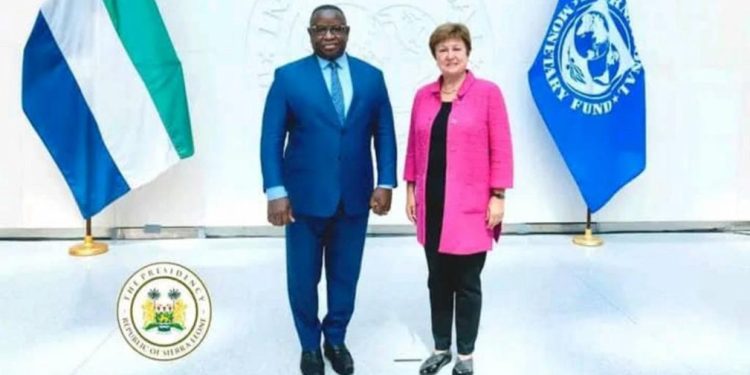By Mackie M. Jalloh
In a significant move to support Sierra Leone’s economic stability, the International Monetary Fund (IMF) has approved a new $253 million, 38-month Extended Credit Facility (ECF) programme for the country. Announced by the Ministry of Finance on November 1, 2024, this programme is intended to address Sierra Leone’s pressing economic challenges, focusing on debt vulnerabilities, inflation control, and bolstering international reserves. The programme also aims to support poverty reduction and promote inclusive growth by emphasizing structural reforms and targeted social spending.
The approval follows the IMF’s 2024 Article IV consultations, which took place on October 31. During these consultations, the IMF’s Executive Board evaluated Sierra Leone’s economic landscape and expressed appreciation for the government’s commitment to strengthening macroeconomic conditions. The IMF commended Sierra Leone’s efforts to maintain economic reforms despite a fragile socio-economic environment, further strained by recent global challenges such as the pandemic and geopolitical tensions that have impacted security and economic stability.
Key Goals of the ECF Programme
The ECF programme is designed to help Sierra Leone navigate economic challenges through a series of reforms and policy measures.
Specifically, it aims to:
- Restore Economic Stability: The programme will support Sierra Leone’s ongoing macroeconomic adjustments to stabilize the economy. These adjustments include efforts to manage debt effectively, reduce inflation, and rebuild the country’s international reserves. By addressing these critical areas, the IMF seeks to promote a more resilient economic environment.
- Promote Inclusive Growth and Poverty Reduction: A significant aspect of the ECF is its focus on poverty reduction and inclusive growth. This will be achieved through structural reforms and targeted social spending, which are expected to create opportunities for the economically disadvantaged and ensure equitable access to resources.
- Enhance Governance and Institutional Strengthening: The programme also aims to strengthen governance and institutions, particularly in implementing the country’s Medium Term National Development Plan (MTNDP) 2024-30. By reinforcing governance structures, Sierra Leone can improve accountability, transparency, and overall effectiveness in public administration.
In line with these objectives, the IMF encouraged the Sierra Leonean government to sustain its reform momentum and continue addressing key areas, such as narrowing gender gaps, enhancing customs administration, building a social safety net, and proactively managing climate-related risks.
Recognition and Recommendations from the IMF Board
The IMF’s Executive Board acknowledged the progress made by the Sierra Leonean government in advancing economic reforms and stabilizing the economy under challenging conditions. This progress is seen as a testament to the government’s dedication to fulfilling the objectives outlined in the National Development Plan (NDP) 2024-2030, which emphasizes sustainable development and poverty alleviation.
To ensure the success of the ECF programme, the IMF recommended that Sierra Leone maintain its focus on reforms. The Board highlighted the importance of gender equality measures, customs administration improvements, and social protection systems to mitigate poverty’s impact on vulnerable populations. These recommendations align with the government’s commitment to fostering inclusive growth and a more robust safety net for the nation’s citizens.
Minister of Finance Commits to Strong Program Implementation
Minister of Finance Sheku Ahmed Fantamadi Bangura expressed gratitude to the IMF for its support and reiterated Sierra Leone’s commitment to implementing the ECF programme. He affirmed that the reforms under the ECF arrangement align with Sierra Leone’s national interests and the government’s vision for a transparent, accountable public financial management system. Minister Bangura emphasized that the government’s commitment to reform would improve public services, alleviate poverty, and strengthen social safety measures, contributing to a better quality of life for Sierra Leoneans.
Minister Bangura underscored the importance of program ownership and steadfast implementation to achieve the goals of macroeconomic stability, debt sustainability, and inclusive growth. He also highlighted that contingency measures would be in place to respond to potential economic shocks, ensuring that Sierra Leone remains on a sustainable growth path.
The Path Forward: Challenges and Prospects
Sierra Leone faces numerous economic challenges, from managing debt obligations to tackling inflationary pressures that strain household incomes. The ECF programme provides critical financial support to address these issues, but success will largely depend on effective implementation and sustained commitment to the reform agenda. The focus on gender equality, customs improvements, and climate resilience reflects an understanding of Sierra Leone’s specific needs and vulnerabilities.
The programme’s success could create a ripple effect, attracting further investment and fostering confidence in Sierra Leone’s economy. However, there are risks to consider, including potential global economic uncertainties and internal factors that could impact programme outcomes. The government’s ability to navigate these challenges while remaining accountable to the public will be crucial.
With the IMF’s backing, Sierra Leone has an opportunity to build a more resilient and inclusive economy. As the government moves forward with the ECF program, all eyes will be on the Ministry of Finance and other institutions to ensure that the reforms achieve their intended impact and deliver lasting benefits for Sierra Leone’s people.











